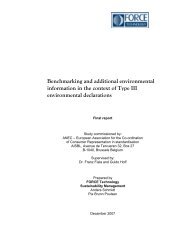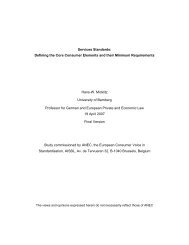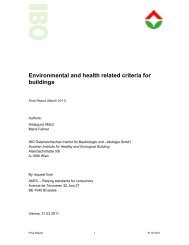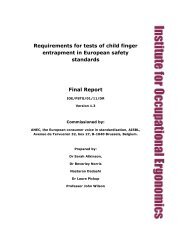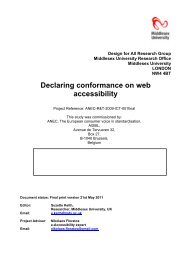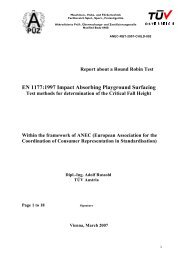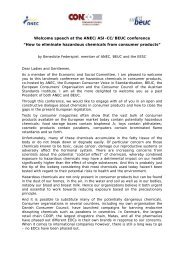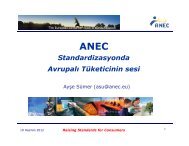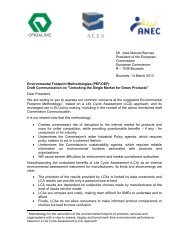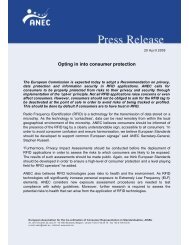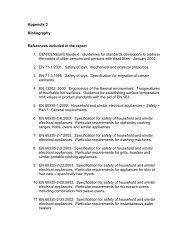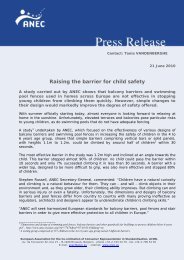HOTEL FIRE SAFETY IN THE EUROPEAN UNION - ANEC
HOTEL FIRE SAFETY IN THE EUROPEAN UNION - ANEC
HOTEL FIRE SAFETY IN THE EUROPEAN UNION - ANEC
Create successful ePaper yourself
Turn your PDF publications into a flip-book with our unique Google optimized e-Paper software.
<strong>HOTEL</strong> <strong>FIRE</strong> <strong>SAFETY</strong> <strong>IN</strong> <strong>THE</strong> <strong>EUROPEAN</strong> <strong>UNION</strong><br />
<strong>THE</strong> CONSUMER PERSPECTIVE<br />
IV International Forum Fire Safety in Hotels-Segurhotel, Mallorca, October 2010<br />
<strong>ANEC</strong>-SERV-2010-G-037<br />
European Association for the Co-ordination of Consumer Representation in Standardisation<br />
Av. de Tervueren 32, box 27 – B-1040 Brussels, Belgium - phone +32-2-743 24 70 - fax +32-2-706 54 30<br />
e-mail: anec@anec.eu - internet: www.anec.eu
<strong>ANEC</strong>-SERV-2010-G-037rev<br />
August 2010<br />
List of Contents<br />
Summary.....................................................................................................2<br />
1.Relevant trends & consumer concerns in the EU accommodation sector ..3<br />
2. Current Community legislation ................................................................3<br />
2.1. A case study: Opera Hotel in Paris ............................................................3<br />
2.2. The lack of a binding legislative tool at EU level ...........................................4<br />
3. <strong>ANEC</strong>’s call for a directive on hotel fire safety .........................................5<br />
4. Protecting consumers’ safety is an investment for hotel industry ...........6<br />
ANNEX - <strong>ANEC</strong>’s involvement in longstanding discussions at European level<br />
....................................................................................................................7<br />
APPENDIX – About <strong>ANEC</strong>...........................................................................10<br />
Contact person at the <strong>ANEC</strong> Secretariat ....................................................10<br />
1
<strong>ANEC</strong>-SERV-2010-G-037rev<br />
August 2010<br />
Summary<br />
Hotel safety is an issue of fundamental importance from a consumer perspective.<br />
Many consumers take it for granted when travelling, expecting a similar standard of<br />
safety from one Member State to another. Regrettably, this is not the case. Hotel<br />
fires pose a particular risk to the safety of consumers, risk which <strong>ANEC</strong> believes can<br />
be much reduced through stronger and more harmonised European regulation.<br />
Our experience over a number of years indicates that non-binding documents have<br />
proved insufficient to achieve a common, acceptable, minimum level of fire safety<br />
in hotels. We therefore call for a binding, legislative instrument on fire safety in<br />
hotels where the use of standards could be made to specify detailed requirements.<br />
A new EU directive on fire safety in hotels shall:<br />
1. extend scope to cover establishments offering accommodation to less than<br />
20 guests<br />
2. apply to all establishments (existing and new)<br />
3. put emphasis on fire safety management, emergency planning, staff training<br />
4. put particular emphasis on needs of persons with disabilities<br />
In this paper we give an overview of consumer concerns and <strong>ANEC</strong> involvement in<br />
the debates around the need for progress in hotel fire safety in the EU area. We<br />
also highlight how a directive on hotel fire safety would be of benefit both for<br />
consumers and accommodation providers.<br />
2
<strong>ANEC</strong>-SERV-2010-G-037rev<br />
August 2010<br />
1. Relevant trends & consumer concerns in the EU accommodation sector<br />
Europe is the largest tourism destination in the world, according to data from<br />
Eurostat and the WTO. Europe received 40% of the world international arrivals 1 in<br />
2008 and these are estimated to increase in future. EU tourists account for 90% of<br />
this total 2 .<br />
Thanks to the free movement of citizens in the Single European Market and trends,<br />
such as increased access to internet bookings and budget travel, it has become far<br />
easier for European consumers to travel from one EU country to another.<br />
In 2009, hotels and similar establishments hosted nearly 1.5 billion nights in the EU<br />
27 area². The accommodation sector is almost exclusively dominated by SMEs and<br />
especially micro-enterprises employing fewer than 10 people. This group accounts<br />
for at least 75% of the industry. In countries such as the Czech Republic, Greece<br />
and Poland, the share of micro-enterprises exceeds 90% 3 .<br />
When choosing a hotel, consumers tend to take into account location, amenities,<br />
quality of food and value for money. Whether a safe escape can be made in case of<br />
fire is not uppermost in most people’s minds as consumers expect a high level of<br />
fire safety in every hotel they say in. However, hotel safety measures differ widely<br />
among EU countries. Even in the same country, the degree of safety offered<br />
depends on the size of the hotel and its year of construction. A common minimum<br />
level of safety throughout the European Union has not yet been achieved.<br />
Although complete and comparable data at the EU level on the number of hotel fire<br />
accidents and casualties is not available, data from the UK shows that there were<br />
approximately 2000 fires in ‘hotels, boarding houses, hostels and similar’, both in<br />
2006 and 2007 4 .<br />
The incidence of hotel fires must be considered alongside the ageing of the broader<br />
European population. In terms of fire safety, few hotels are currently taking the<br />
particular needs of older or physically impaired people systematically into account.<br />
2. Current Community legislation<br />
2.1. A case study: Opera Hotel in Paris<br />
The case study below shows how one of the deadliest hotel fires in Europe in recent<br />
years (Paris, 2005) happened in a hotel considered to be abiding by existing laws<br />
and regulations.<br />
In 2005, a devastating fire at the Opera hotel, in the centre of Paris, killed 25<br />
people, including 11 children. More than 40 people were injured. There were many<br />
causes of this tragedy:<br />
1<br />
“International tourist arrivals” includes non-EU tourists as well as EU tourists who visit a country other<br />
than their residence country<br />
2<br />
European Commission Discussion Document and Communication "Europe, top tourist destination in the<br />
world – a new political framework for European Tourism"<br />
3<br />
Study on Competitiveness of the EU tourism industry, Ecorys, 2009<br />
4<br />
Communities and Local Government, Fire Statistics, United Kingdom hotels, boarding houses, hostels and<br />
similar<br />
3
<strong>ANEC</strong>-SERV-2010-G-037rev<br />
August 2010<br />
– Serious breaches of safety obligations;<br />
– The rental of rooms without windows where many victims died;<br />
– Overcrowding of the hotel;<br />
– Unqualified hotel staff;<br />
– Changes to the hotel premises without planning permission;<br />
– Lax controls by the administrative authorities,<br />
– The permanent obstruction of the only staircase.<br />
Several of these causes could have probably been avoided if attention had been<br />
paid to existing rules. However, the hotel had been checked only one month before<br />
the accident and all fire safety equipment was considered satisfactory. The Deputy<br />
Director for Public Safety (Prefecture of Police, Paris) revealed 5 after the accident<br />
that the hotel concerned was officially considered safe because it was abiding by<br />
the laws and applicable standards. Being an old hotel, it was not required to apply<br />
regulations demanding fire resistant doors (for example), nor was it illegal to have<br />
guests in rooms without windows.<br />
Following this tragedy, new rules for hotel fire safety 6 were adopted in France in<br />
2006, with a view to their entry into force by 2011. Given these measures were<br />
considered by the industry to be too drastic to be implemented within the transition<br />
period, in July 2010, the French ministry for tourism proposed to postpone the date<br />
of entry into force to 2015, the same year rules for the accessibility of public<br />
places 7 will be applicable. This means consumers would be exposed to inadequate<br />
levels of fire safety for no fewer than 11 years after the Paris fire.<br />
It is clear there is need for collation of statistics on fires in hotels and tourist<br />
accommodation at European level and for records to be kept by hotels. However, a<br />
lack of statistics should not be an excuse for delaying action until further deaths<br />
occur.<br />
This case study shows how insufficient and inadequate existing laws and regulations<br />
in Europe are and demonstrates the need to set a common minimum acceptable<br />
level of fire safety in European hotels.<br />
2.2. The lack of a binding legislative tool at EU level<br />
At the moment, there is no up-to-date European reference document on fire safety<br />
in hotels, nor is there a ‘General Service Safety Directive’ which would serve as an<br />
overarching instrument for service safety in Europe, as is the case for products.<br />
When adopted over 20 years ago, the aim of Council Recommendation 86/666/EEC<br />
on fire safety in hotels was to define clear, minimum safety standards for all hotels<br />
5 Interview on France 2 ‘Complément d’enquête’, 23 May 2005<br />
6 Decree of 24 July 2006 concerning the approval of various provisions supplementing and amending<br />
regulation against the risk of fire and panic in establishments receiving public (small hotels)<br />
7 law of 11 February 2005 "for equal rights and opportunities" of people with disabilities, introducing a series of<br />
measures regarding accessibility sites receiving public<br />
4
<strong>ANEC</strong>-SERV-2010-G-037rev<br />
August 2010<br />
in the EU. As concluded in the 2001 Commission Report 8 and the 2009 FTO 9 study:<br />
Analysis of the implementation of existing regulations on fire safety in tourist<br />
accommodation, this objective has not been achieved, particularly as some Member<br />
States have chosen to apply the provisions only to new or renovated hotels.<br />
It is clear Council Recommendation 86/666/EEC, including its technical annex, no<br />
longer offers minimum, state-of-the-art safety standards for hotel accommodation.<br />
Moreover, considering the failure of this non-binding instrument to ensure a<br />
common minimum level of safety in hotels, <strong>ANEC</strong> believes there is urgent need for<br />
a stronger European instrument, namely a Directive on fire safety in hotels. Not<br />
only would a European Directive in this field bring true benefits to consumers, but<br />
such an instrument would also be flexible enough to take into account the vast<br />
range of hotel types and sizes. Negligence should be reduced as far as possible.<br />
Thus effective enforcement and the monitoring of the enforcement of legislation are<br />
essential.<br />
3. <strong>ANEC</strong>’s call for a directive on hotel fire safety<br />
All consumers are entitled to benefit from a minimum standard of safety throughout<br />
Europe, and hotels need to be provided with reference to good practices in order to<br />
achieve this. The requirements we are seeking are not meant to create an obstacle<br />
to hotels but support to the efforts they make.<br />
<strong>ANEC</strong> calls for legislation that covers emergency planning, fire safety management,<br />
and staff training and awareness, i.e. on issues which can be addressed in new and<br />
old hotels, irrespective of size. The measures that would result from such legislation<br />
are probably already in place in hotels that are genuinely safe.<br />
In order to improve consumer protection, while noting the increasing number of<br />
consumers with disabilities, <strong>ANEC</strong> recommends four changes be incorporated into a<br />
revised legislative instrument, taking the current Recommendation as the basis:<br />
1. The scope should be extended to include establishments of fewer than 20<br />
guests. Most consumers would be unsettled to discover they may be less well<br />
protected in a small holiday hotel than a large hotel complex.<br />
2. The instrument should apply to all hotels, existing, renovated and new.<br />
3. More emphasis should be placed on emergency planning, fire safety<br />
management, staff training and awareness. Less emphasis should be<br />
placed on constructional features: these would be better addressed either in<br />
legislation (e.g. the Construction Products Directive) or European Standards.<br />
4. Finally, far more attention should be given to the measures taken to<br />
ensure the safety of persons with disabilities. Particular examples are:<br />
8 Report from the Commission on the application of the Council Recommendation on fire safety in existing<br />
hotels (86/666/EEC), 27 June 2001, COM(2001) 348final<br />
9 Federation of Tour Operators<br />
5
<strong>ANEC</strong>-SERV-2010-G-037rev<br />
August 2010<br />
• The simple measure of ensuring that alarms and safety signs can be<br />
understood by people with visual or hearing impairment (e.g. vibrating<br />
alarms to be placed under pillows).<br />
• An obligation on hotel staff to show the emergency exit routes to all<br />
guests with disabilities, especially those travelling alone.<br />
• Training on customer care for staff, including disability awareness.<br />
• The designation of ‘refuge areas’ for wheelchair users and others with<br />
reduced mobility.<br />
• Regular audits of hotel accessibility.<br />
European standards should play a role in underpinning the legislation and specifying<br />
technical requirements when needed. Apart from acknowledging the need for a<br />
European directive, <strong>ANEC</strong> agrees with the Federation of Tour Operators on the need<br />
for the European Commission to collate statistics on fires in European tourist<br />
accommodation and to contract a reputable, experienced fire safety engineering<br />
organisation to study the level of fire safety in tourist accommodation in the EU<br />
Member States.<br />
In the Annex below, further details are given on <strong>ANEC</strong>’s position and involvement in<br />
longstanding discussions at the European level on the need for progress in hotel fire<br />
safety in the EU.<br />
4. Protecting consumers’ safety is an investment for hotel industry<br />
<strong>ANEC</strong> does not question, nor wants to reduce, the diverse nature of establishments<br />
within individual Member States, but we are convinced that universal basic safety<br />
requirements are essential and can be identified.<br />
Ensuring consumers benefit from safe services when in tourist accommodations<br />
must be achieved if Europe is to keep its leading position as a tourist destination<br />
and remain competitive. Safety should be recognised as an added value for the EU<br />
tourism industry. Hotels generate returns on their investment in safety measures.<br />
Moreover, the European population as a whole is ageing. This older population may<br />
have considerable purchasing power and be likely to travel for reasons of tourism.<br />
Consequently, there will be even greater reason for accessibility to be considered<br />
by tourism service providers. Safe, accessible tourism services benefit all tourists<br />
and can increase profitability of the service provider, regardless of the size of the<br />
provider, and give companies a competitive advantage 10 .<br />
As the tourism industry comprises SMEs for the most part, it is essential any future<br />
legislation reflects the ability of small businesses to meet its requirements.<br />
10 See also Preliminary <strong>ANEC</strong> position paper on Consumer Requirements in Tourism Services (<strong>ANEC</strong>-SERV-<br />
2010-G-010)<br />
6
<strong>ANEC</strong>-SERV-2010-G-037rev<br />
August 2010<br />
Having a minimum acceptable level of (hotel) service safety throughout<br />
the European Union will bring benefits both to consumers and the tourism<br />
industry. It will allow consumers from around the world to make comparisons and<br />
informed choices among tourism services and ensure that European services can<br />
meet their expectations.<br />
We believe it is high time to ensure standards are raised to the level able to meet<br />
the expectations of European consumers and to reduce the number of fatalities in<br />
hotel fires.<br />
ANNEX - <strong>ANEC</strong>’s involvement in longstanding discussions at European level<br />
For several years, <strong>ANEC</strong> has taken part in discussions at European level on possible<br />
means to improve the level of hotel fire safety.<br />
In 2004, <strong>ANEC</strong> commented on the European Commission Working Document E –<br />
Fire Safety in Existing Hotels 11 . We drew the attention of the Commission Consumer<br />
Safety Working Party in particular to the lack of reference in the Recommendation<br />
on the protection of guests with disabilities. <strong>ANEC</strong> had previously welcomed the<br />
European Parliament Resolution of 4 May 1994 which called on the Commission to<br />
propose a Directive on fire safety in hotels.<br />
In 2006, following several Parliamentary questions on hotel fire safety, a dialogue<br />
between the Commissioner for Consumer Affairs and European Parliament opened<br />
to discuss policy options. In response to a request from DG SANCO for views on the<br />
revision of Council Recommendation 86/666/EEC, <strong>ANEC</strong> called on the Commission<br />
to propose a Directive on fire safety in hotels, based on revised provisions and<br />
the guidelines of the 1986 Recommendation. In particular, <strong>ANEC</strong> stressed that the<br />
revised instrument should take the needs of people with disabilities better<br />
into account by revising the existing emergency planning, staff training<br />
and fire safety management provisions. Finally, we asked that the scope of<br />
the current instrument be broadened to cover smaller establishments.<br />
Moreover, further to the conclusions of the EU expert group meeting on fire safety<br />
in hotels in 2006 12 , <strong>ANEC</strong> noted its lack of support for the option of finalising the<br />
technical guidelines of the Recommendation through a CEN Technical Report. <strong>ANEC</strong><br />
stressed such a voluntary measure would not be robust enough to reduce the risks<br />
related to hotel fires and do little to increase consumer confidence and protection.<br />
However, we do believe voluntary standards (such as those developed by CEN)<br />
have a role to play in supporting a legislative framework by providing the more<br />
technical specifications and requirements.<br />
11 <strong>ANEC</strong> comments on the European Commission Working Document E – Fire Safety in Existing Hotels<br />
(<strong>ANEC</strong>/2004/COORD/034)<br />
12 EU expert group meeting on fire safety in hotels on 27 April 2006, final report<br />
7
<strong>ANEC</strong>-SERV-2010-G-037rev<br />
August 2010<br />
In September 2008, <strong>ANEC</strong> was asked for its views for the Parliamentary study 13 on<br />
the topic. We stressed our wish for a Directive, able to deal more broadly with fire<br />
safety in hotels and addressing all establishments, irrespective of size or age. The<br />
results of the study showed all stakeholders agreed that safety management, staff<br />
training and emergency procedures should be improved in European hotels.<br />
HOTREC voluntary charter on hotel fire safety in Europe<br />
In 2009, as no consensus had been reached on the revision of Recommendation<br />
86/666/EEC, the discussion on possible legislative proposals was put on hold and<br />
HOTREC (a European association of hotels and restaurants) began developing a<br />
Charter on fire safety in European hotels.<br />
Under the umbrella of HOTREC, a working group from the hotel industry was set<br />
up. In addition, a Stakeholder Consultative Committee including MEPs, Commission<br />
representatives, tour operators, trade unions, insurers, travel agents and others<br />
was created to give feedback on the Charter on Hotel Fire Safety and Management,<br />
Buildings and Systems (MBS) Methodology developed by the working group.<br />
<strong>ANEC</strong> participated in the Stakeholder Consultative Committee and contributed 14 to<br />
the drafts. These contributions reflected the elements we would want to see in a<br />
future legislative instrument. We welcomed revision of the first drafts of the Charter<br />
and Methodology to address some of our preliminary comments. However, we and<br />
other stakeholders deplored both the proposed voluntary nature of the Charter and<br />
its application to national associations rather than individual hotels. As neither the<br />
Charter nor the Methodology aimed beyond existing national regulations, it was<br />
also far from clear how a high level of fire safety would be assured in areas of no or<br />
little regulation, or a consistent safety level across Europe achieved. We expressed<br />
concern at the vagueness of several key safety requirements and the lack of a way<br />
to monitor implementation of the Charter or Methodology. Despite these criticisms,<br />
the fundamental flaw was that the initiative would cover only HOTREC members: it<br />
could not embrace all hotels as would a legislative instrument.<br />
At the November 2009 meeting of its General Assembly, HOTREC members once<br />
again did not agree to individual hotels being asked to commit to the Charter,<br />
despite the requirements of the Charter not being particularly demanding and going<br />
no further than regulatory practice in some Member States.<br />
At the beginning of 2010, the proposed Charter was deleted by HOTREC members.<br />
Although the Methodology was published, it is merely guidance which HOTREC does<br />
not intend to impose on hoteliers, nor wishes to see invoked against an individual<br />
13 IP/A/IMCO/ST/2008-15 European Parliament study on Hotel Safety, 2008<br />
14 Preliminary <strong>ANEC</strong> comments on HOTREC Hotel Fire Safety Charter and Methodology ( Ref.: <strong>ANEC</strong>-SERV-<br />
2009-G-024rev and Further <strong>ANEC</strong> comments on HOTREC Hotel Fire Safety Charter (Ref.: <strong>ANEC</strong>-SERV-2009-<br />
G-049)<br />
8
<strong>ANEC</strong>-SERV-2010-G-037rev<br />
August 2010<br />
hotel or national trade association. Although some national trade associations are<br />
willing to work with the guidance document and to encourage its use in hotels, we<br />
believe its success in improving hotel fire safety will be limited. We do not consider<br />
the Methodology provides enough details to help hotels - especially smaller ones -<br />
achieve notable improvements without the support of consultants.<br />
<strong>ANEC</strong> does recognise the efforts made by the HOTREC working group to consider<br />
the views of all stakeholders in the drafting of the Charter and the Methodology and<br />
understands that extending the signature of the Charter to individual hotels would<br />
have been a difficult political issue for HOTREC. However, without this prerequisite,<br />
the effectiveness of the Charter was always going to be extremely limited. Nor can<br />
we overlook the many hotels outside the HOTREC membership that would not have<br />
been covered by the Charter or the Methodology.<br />
The failure of the HOTREC initiative again demonstrates the need for a legislative<br />
instrument, such as a Directive, supported by formal European Standards.<br />
9
<strong>ANEC</strong>-SERV-2010-G-037rev<br />
August 2010<br />
APPENDIX – About <strong>ANEC</strong><br />
Raising standards for consumers<br />
<strong>ANEC</strong> is the European consumer voice in standardisation, defending consumer<br />
interests in the processes of technical standardisation and conformity assessment<br />
as well as related legislation and public policies. <strong>ANEC</strong> was established in 1995 as<br />
an international non-profit association under Belgian law and represents consumer<br />
organisations from 31 European countries. <strong>ANEC</strong> is funded by the European Union<br />
and EFTA, with national consumer organisations contributing in kind. Its Secretariat<br />
is based in Brussels.<br />
More information about <strong>ANEC</strong> and its activities is available at www.anec.eu<br />
Contact person at the <strong>ANEC</strong> Secretariat<br />
Michela Vuerich<br />
+32/2-743 24 70<br />
+32/2-706 54 30<br />
michela.vuerich@anec.eu<br />
Avenue de Tervueren 32, box 27 – BE-1040 Brussels, Belgium.<br />
This paper was drafted by the <strong>ANEC</strong> Secretariat based on the positions of <strong>ANEC</strong> members<br />
on Hotel Fire Safety, as described in the <strong>ANEC</strong> position papers and comments referred to<br />
throughout the document.<br />
10



